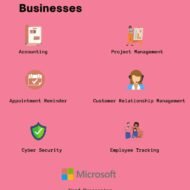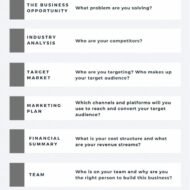Currently Browsing: Project Management
Posted by Managementguru in How To, Project Management, Supply Chain Management
on Jun 8th, 2022 | 0 comments

Managing a construction business is no easy task. The sector is capital intensive and demands consistent financing to maintain a steady supply of construction materials and keep operations going. A huge part of becoming a successful construction business owner depends on efficient management. If you’re looking to break into the industry or you’re a current manager after some guidance, these below tips will help you effectively manage a construction business. Use the Right Tools and Products Construction tools and products evolve with the industry. As a construction business owner, you need to be equipped with current tools and resources fueling the industry, leveraging them for effective outputs. Investing in construction tools can be a dicey situation and purchasing isn’t always the best way to invest in tools. You can purchase drills, hammers, trowels, and other essential tools for your site workers. However, heavy-duty equipment like excavators and backhoe loaders can be rented rather than bought. Buying ties you to storage and maintenance costs which might be financially draining. Both options, however, have their pros and cons. Therefore, assessing them before making your investment decision can never go amiss. For construction supplies, it’s important to deal with the right retail partners. They can afford you comfortable payment and usage terms for all materials, including those needed for modular building products. Make Safety a Priority The construction industry is a hotspot for work-related accidents. The U.S. Occupational Safety and Health Administration says that fall hazards are the leading cause of accident injuries on construction sites nationwide. The U.S. Bureau of Labor Statistics also revealed that over 150,000 fall accidents occur yearly. As a business, these accidents can dampen employees’ morale and cost your business a lot of medical, severance, and relief expenses. In critical conditions, an accident on your site can cost you your operating license and affect your operational relationships with partners and financiers. Therefore, it’s crucial to prioritize safety on your construction site. Ensure all workers have their safety apparel on before visiting the worksite. Maintain ladders and operational tools to avoid failure while on the job. Developing a periodic program to sensitize employees on the best safety practices can also help a great deal. Leverage Data and Technology The construction industry is no exception to the continuous transformation of how we work through technology. Modern construction tools have become smarter, demanding site workers to be more tech-savvy. Many construction businesses have also grown more resilient by using data to mitigate risks and manage predictability. They deploy big data systems like Artificial Intelligence (AI) and Machine learning (ML) to harness effective insights even before the project stages. These systems help model structures and determine structural defects at the project blueprinting stage. Tech systems also help contractors reduce uncertainties like the impact of changing weather conditions on construction progress. Avoid Wasteful Preparations Research shows that 98 percent of megaprojects suffer cost overruns, and about 77 percent do not meet their construction deadlines. Wasteful operations are a travesty of efficiency. So, construction managers need strict levels of accountability to manage waste, from materials to financing. Increase Your Cash Flow Construction employees typically receive payments on a bi-weekly basis, so you’ll need more money to manage running costs and fuel the progress of your construction business. Spreading out your costs, early invoice communication, and avoiding underbilling are a few best practices to help you increase your cash flow. All in all, the construction industry is booming and new companies have a significant potential to attain profitability – the industry has a current valuation beyond a trillion dollars. Getting a piece of this cake requires a lot of discipline and consistent efforts, and...

Posted by Managementguru in Architecture and Interior Design, Business Management, Financial Management, Project Management, Real Estate Investment
on Mar 25th, 2022 | 0 comments

Getting onto the property ladder is a life goal for many people, particularly those who want to own their homes and have the freedom to create the perfect living space for themselves. However, while becoming a homeowner is great in its own right, real estate is possibly one of the best options available if you are looking for general investment opportunities. If this sounds interesting to you, here are a few benefits of investing in real estate that you might want to know. A Great Source of Income If you own multiple properties, this could be an excellent opportunity to make some additional income. You could either choose to lease your vacant property to tenants and make a profit from the rent charges, but if you do choose to become a landlord, be aware that there are certain legal obligations and regulations that you will need to follow. Alternatively, if you are not looking for full-time tenants to manage, you could lease the second property as a vacation rental or do some renovations to it to boost its value and sell it for a profit. If you want help with the legal side of purchasing and selling properties, search for specialist attorneys such as the Avenue Law Firm. Tax Breaks While there are expenses to consider if you are going to invest in real estate, you might also find that you are eligible for certain perks when it comes to tax deductions. If you are using the property as a source of income, you could deduct the cost of owning and managing the building within reason from your taxed income. Demand Whether you are looking to lease commercial property or residential, there will always be a demand for it. While there are still risks involved in investing in real estate, generally speaking, it is one of the more stable areas to invest in due to this high demand. As this demand increases, you can raise your rents to match these prices, particularly if the area surrounding your properties is becoming more desirable and make larger profits as a result. Building Equity If you want to improve your overall net worth, building equity is a good way to do this and real estate investment, in particular. As you pay off the mortgage on a property, your equity increases, and this can give you more leverage should you want to invest in other properties or make other investments. Back-Up Residence Another perk of owning more than one property is that it can provide a back-up home to stay in should your main residence need renovations, is damaged, or some other circumstance has resulted in you having to move out temporarily or permanently, provided it was vacant at the time, and you weren’t leasing it out to anyone. This would mean a more comfortable living environment for you should you ever have to leave your usual home. If you have been thinking about making some investments and have been wondering about real estate as an option, consider these benefits and see if they would work well for...

Posted by Managementguru in How To, Learning, Productivity, Project Management
on Jan 14th, 2022 | 0 comments

The DIY movement is a powerful thing for a number of reasons, but most importantly, because of the attitude it promotes. Too often in modern society, people will stop learning because they have left school. DIY is built on the foundation that learning to Do It Yourself will help you to become better in every aspect of your life. If that sounds good to you, then this article aims to explain some more about the advantages of DIY. Why DIY is So Useful DIY, as a concept, is an incredibly useful way to think and approach to solving problems for a number of reasons. There are plenty of issues that you may run into that are generally the domain of professionals in one way or another. However, by learning how to do these things yourself, you provide yourself with a fair few benefits. Home Decor Mood Board Do Things Your Way. One of the main benefits of learning to engage with tasks in a DIY fashion is that you can deal with these problems your way, as and when they arise. No more waiting hours, days, or even weeks for a professional to come and solve your problems; you can deal with them yourself. Save Money. What’s more, by dealing with these problems yourself, you can often save yourself a pretty penny. Professionals are paid well for their services because they deal with issues that are not easy to solve; by learning to deal with these problems yourself, you can save that money and perhaps even put it towards something that you want. What You’ll Need for DIY So, with the understanding of how useful DIY practices can really be for you or anyone else that wants to engage with them, the question becomes: what do you need to get involved with DIY? There are many answers to this question, but two of the most relevant are addressed below. A Can-Do Attitude and a Willingness to Learn. The most important thing to remember when you get involved with DIY is that there is a reason that most people do not deal with these issues themselves. These are difficult tasks that often require a fair amount of skill to handle. By deciding to deal with these issues personally, you must accept that you will have to learn the same skills that those professionals would have applied, although probably to a lower degree at first. What’s more, the confidence to believe that you can deal with those issues will go a long way in helping you get through. The Right Tools. On top of the necessary knowledge, you are going to need the right tools to get the job done. Fortunately, stores such as Tradefix Direct stock plenty of high-quality tools that will almost definitely help you to get the job done. DIY and Learning The truly beautiful thing about DIY is that it is centered around a willingness and desire to learn about the topics and problems that you are dealing with, which means that the more DIY you do, the more you will learn. They say knowledge is its own reward, and with DIY, you can see more clearly what that means. The more you know, the more you can do and the more confidence you will be in dealing with problems of a similar kind in the future. Knowledge truly is power, and DIY is the tool that releases...

Posted by Managementguru in Accounting, Business Management, Productivity, Project Management, Technology
on Jun 17th, 2021 | 0 comments

Software is essential in the daily running of a business. However, when you’re first starting out, it can be hard to know exactly what software to use. This guide will take a look at some of the essential types of software for businesses. Accounting Software Accounting used to be one of the most labor-intensive processes in the running of a small business. It could take up hours of valuable time every week – time that could be spent driving sales and developing new product ideas. Now though, accounting software makes the job considerably easier. It has become so much easier, in fact, that many small businesses have been able to keep accounting in-house, rather than outsourcing it. Project Management Software Project management software is one of the most useful tools that a business can employ. Tools like Asana and Trello allow businesses to keep all of their separate projects in one place and allow employees to keep track. This is a great way to stop projects from falling by the wayside and getting missed entirely. IT management services can help with the proper implementation of project management software, which will increase the efficiency of a business. Appointment Reminder Software There are few things less professional than missing an appointment. Whether you are going to meet a prospective client or pitch to investors, it’s essential to arrive on time. That’s where appointment reminder software comes in. You can align every employee’s calendar into one central calendar and automatically send out reminders. This will help your business run in a professional and timely manner. Customer Relationship Management Software Customer relationship management (CRM) software is used by businesses around the globe. It acts as a central location for all customer information, inquiries, and more. This means that sales reps can keep track of inquiries and orders in an efficient and productive way. It also allows marketing teams to access customer data and use it to make informed decisions. Cybersecurity Software Cybersecurity is one of the most pressing issues of the modern business world. In addition to physical security threats, business owners now have to consider their cybersecurity. That’s why it’s absolutely essential for them to have the latest cybersecurity software. This stops hackers from accessing customer information, bank details, and more. However, even the most advanced cybersecurity software can leave businesses open to attack. Word processing Although word processing software has been around for over 20 years, it’s still one of the most common types of software used by businesses. In fact, most businesses still use it on a daily basis. Microsoft Word has always been the most popular word processing software. However, it is now being challenged by online versions like Google Docs. Employee tracking software As an employer, it has always been difficult to keep track of all of your employees. However, now it has been made easier with time-tracking software. You can analyze their time spent on the computer, how many clicks per minute, and what websites were visited. This encourages employees to stay on task. However, it can also create an uncomfortable work...

Posted by Managementguru in Business Management, Entrepreneurship, How To, Marketing, Project Management
on May 20th, 2021 | 0 comments

Running a business is hard work, but the rewards you get can fiscally make it all worthwhile. A business’s success is often down to the owners of the business and their abilities. For a business to truly be a success you, as the owner, need to take responsibility and you need to be confident of the direction your business is going in. A good business owner works on improving themselves alongside improving their business. This dedication and effort mixed will ensure your business is as successful as it can be. Identify And Target Your Key Audiences To make money within your business you must know who your key audiences are. What are they buying, at what cost and from who? Spending time doing your research beforehand will ensure that you can reach your audiences quickly and easily. If you do not identify and target your audiences then you will see that your business will lack focus and direction which is not good for any fledgling business. Make Your Premises Accessible Even if your business premises are only open some of the time to the public it still needs to be readily accessible. From good on-site parking to wheelchair access such as autoslide doors – an accessible, friendly and welcoming site is one that customers will want to visit. If you do not make your site or premises accessible to as many people as possible then you risk losing customers within your key audience and you risk isolating people, which will not do anything for your business’s reputation. Be Competitive And Be Fair Fair prices, open and honest communication all go hand in hand with good customer care, and excellent customer service. If you are not nice and not fair to your customers, then they will take their business and money to your competitors. Of course, on the flipside you must ensure that you stay competitive as you must be able to offer the same (if not better) prices and product ranges than your competitors, simply to ensure you reach and maintain your key audiences. Focus On Your Profit Margin And On Your Bottom Line If your business does not turn a profit, then it will never truly be a success. A profitable business that focuses on the bottom line as well as on their customers and key audience is a business that will be around for many years to come. If you want true success within business then you must be in it for the long haul, and you must be prepared to be versatile and readily adaptable. Keep Things As Fresh As Possible Stagnant and stale businesses will quickly fall behind. If you do not constantly work on improving what you offer and to whom, then you will notice that you will lose new and existing customers alike. To keep things fresh within your business it is important that you regularly monitor what you are doing and what you are offering. If you do not take time out to monitor your businesses activities, then how will you know what and when to push forward, and what to leave...










